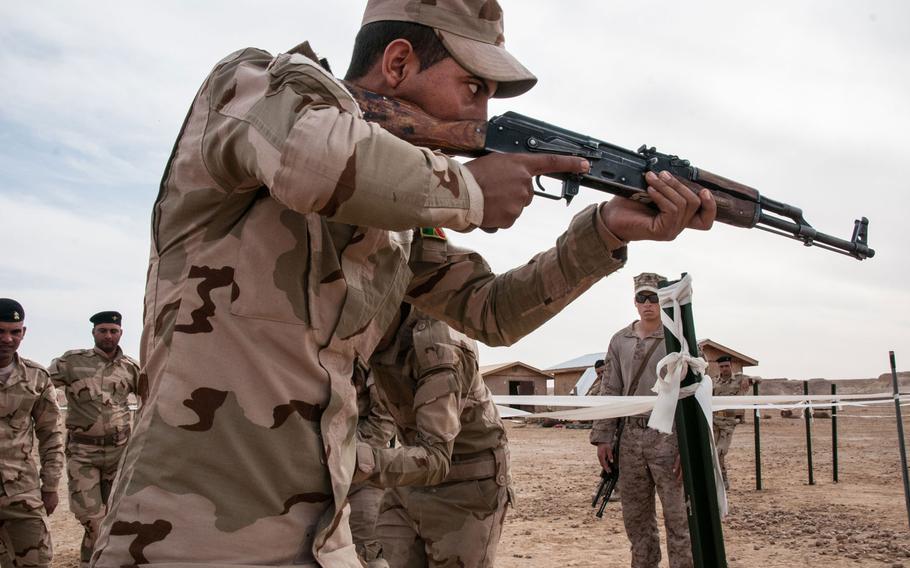
An Iraqi army trainee rehearses proper room clearing techniques, on Feb. 10, 2015, under the supervision of a U.S. Marine during training, as part of their commitment in helping combat the Islamic State militant group in Iraq, at Al-Asad Air Base in Anbar province. Iraq's Prime Minister Haider al-Abadi has called on the U.S. and other coalition nations to ramp up support for his country's beleaguered military. (Mike Lavigne/U.S. Army photo)
WASHINGTON — The 450 additional U.S. troops in Iraq will be working face to face with both their Iraqi counterparts and Sunni Muslim tribal fighters to help plan operations against the Islamic State group rather than focusing on training, the chief of staff of American operations there said Friday.
In the past, U.S. advisers had the clumsy arrangement of communicating with their Iraqi counterparts by phone through a translator, Marine Brig. Gen. Thomas Weidley, chief of staff of U.S. operations in Iraq and Syria, said during a Pentagon briefing.
“The fact that we’re able to get on the ground with our counterparts in the operations centers with the tribal leaders together face to face and day in day out provides us great benefit,” he said.
The troops will be working in Anbar province, a shift away from the earlier U.S. focus on retaking the northern city of Mosul, which the Islamic State still controls. Weidley would not say anything about a timeline for retaking Mosul or Ramadi, a far cry from the bullish U.S. predictions early in the fight that Mosul would be retaken before the Muslim holy month of Ramadan, which began Thursday.
There are now about 3,500 U.S. troops in Iraq, a number that has been steadily climbing as Islamic State militants have proven resilient, especially in Iraq, where they still control a large swath of territory across the country despite recent setbacks in Syria at the hands of Kurdish fighters.
As the Islamic State has remained entrenched, criticism of what some see as a lack of a cohesive U.S. strategy has been growing. Unlike his briefing last month, on the eve of the Islamic State’ capture of Ramadi, Weidley shied away Friday from saying that the militants were “on the defensive throughout Iraq,” instead saying the coalition is making “progress.”
For now, American troops will still be confined to bases, with the off-site recruitment of fighters left to the Iraqis, Weidley said. Touting the recruitment of local Sunni fighters, seen by the U.S. as a key to turning the tide against the Islamic State, Weidley said that 500 were inducted into the “Popular Mobilization Forces,” as the collection of Sunni tribal fighters and Shiite militias is known, and were given pay and weapons.
One effort U.S. troops are focusing on is helping Iraqis combat the increasingly large and effective suicide car bombs the Islamic State has been creating out of armored vehicles, such as Humvees, Weidley said.
“It’s become the precision-guided munition for Daesh,” he said, using the Arabic acronym for the Islamic State.
druzin.heath@stripes.com Twitter: @Druzin_Stripes